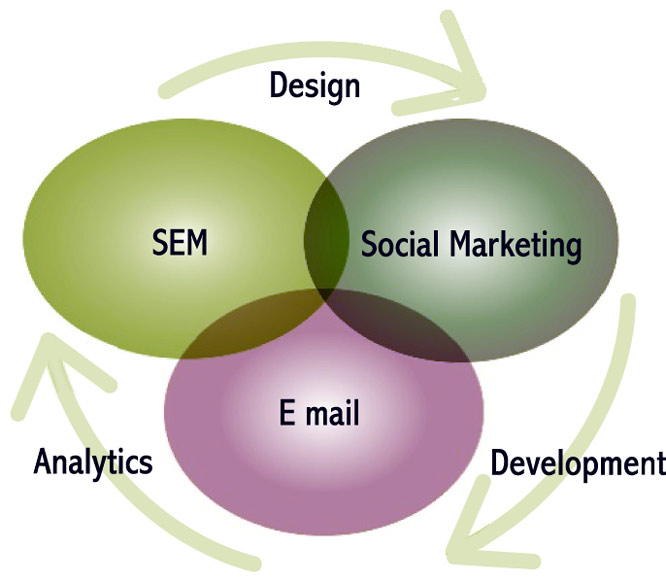Internet Marketing Plan Template: How to Write an Internet Marketing Plan

BEHIND EVERY successful Internet business is a well-researched Internet marketing plan.
An Internet marketing plan provides a company its step-by-step program for how to market its product or service to a specific target market, and it helps a company remain focused on its marketing objectives.
Your Internet Marketing Plan will define all of the components of your marketing strategy. You will address the details of your market analysis, sales, advertising, and public relations campaigns. The most successful Internet marketing plans integrate both Internet marketing strategies as well as traditional (offline) marketing strategies.
The Topics You Need to Discuss in Your Internet Marketing Plan include:
1. Market Research
Collect, organise, and write down data about the market that is currently buying the product(s) or service(s) you will sell. (From now on we’ll refer to your products or services as “product”.) Some areas to consider could include:
- Market dynamics, patterns including seasonality
- Customers-demographics, market segment, target markets, needs, buying decisions
- Product—what’s out there now and what’s the competition offering? Conduct market research by going to google.com and conduct searches on the types of products or services you want to sell
- Current sales in the industry
- Suppliers-vendors that you will need to rely on
- Target Market(s)—To be successful, focus on one or two small niche markets instead of a large general market. Niche markets have far less competition and they tend to be more profitable. If there is one thing you can do to help your odds of being successful in business it is to focus on one or two small niche markets
2. Product
Describe your product (or service). How does your product relate to the market? What does your market need, what do they currently use, what do they need above and beyond current use?
3. Competition
Describe your competition. Develop your “unique selling proposition.”
- What makes you stand apart from your competition?
- Why are you special?
- Why should a customer choose to do business with you instead of one of your competitors?
The better job you can do to differentiate yourself from your competitors, the more success you will have.
4. Mission Statement
Write a few sentences that state:
- “Key market” – who you’re selling to – be very specific!
- “Contribution” – what you’re selling
- “Distinction” – your unique selling proposition – why are you different from your competition?
5. Internet Marketing Strategies
Write down the Internet marketing and promotion strategies that you want to use or at least consider using. Strategies to consider include:
- The major online marketing tools are Social Media Marketing. The most successful we’ve found is the Social Media Chain by the More Customers Group. It increased MCG’s test website traffic from 400 to just under 14,000 unique visitorsin under 60 days.
- Video marketing comes a close second. It basically cinsists of making 30 second commercials, just like TV commercials, and then publishing your videos on websites like YouTube and Vimeo. Here’s one we made for Australia’s Bendigo Bank. Feel free to contact us if you’d like to know more.
- Search Engine Optimisation (SEO). What this means is using optimisation techniques so search engines (Google, Yahoo, MSN) will rank your website within the top 10 search results. By doing this you can get literally thousands of people to your website every day for free.
- Pay Per Click Search Engine Marketing. Think Google Adwords or Facebook. They’re the main players for Australian businesses. When you use pay-per-click you are bidding on keywords so that your ad is displayed when a person conducts a search on a particular keyword or key phrase.
- Affiliate Marketing. This is where other websites market your products for you and you pay them a commission on each sale. This is an outstanding way to create a successful Internet business.
- Write Articles and distribute them online. This is a great way to get tons of one-way links pointed at your website (which search engines love!). I try to write one new article each week and it has gotten me thousands of links pointed at my websites. And remember, the more links that point at your website, the higher search engines will rank your website. And, if getting tons of links pointing at your website wasn’t enough, writing articles will also send targeted traffic to your website and it will make you an expert in your field. The way it works is very simple. You write a 1-page article and use online article distribution services to distribute your article to hundreds other websites, blogs, and ezines (electronic magazines). People them read your articles to learn about your products or services. To find out more contact me direct.
- Write press releases and distribute them online. Just like writing and submitting articles, this is a very simple and extremely effective way to get tons of links pointed at your website. It is also a great way drive targeted traffic to your website.
- Document sharing is still a very viable way to get your message out there, and also to create links pointing back to your website. Basically you create a PDF which has hyperlinks embedded into it which point back to your web pages, not just your website home page.
6. Offline/Traditional Advertising Strategies
- Networking – go where your market is, Chamber of Commerce, BNI, etc
- Direct marketing using sales letters, brochures, postcards, flyers, etc.
- Advertising-Print media, directories, billboards, yellow pages, radio, TV
- Training programs-Seminars that you give to increase awareness
- Write articles for magazines, your local newspaper, and other publications read by your industry. Doing this will help you to become known as an expert
- Direct/personal selling
- Publicity/press releases
- Trade shows
- Referral programs
- Co-marketing with businesses that share your target market
- Barter
7. Pricing, Positioning and Branding
From the information collected, establish strategies for determining the price of your product, where your product will be positioned in the market and how you will achieve brand awareness.
8. Budget
Budget your dollars. What strategies can you afford? How much can you afford to spend per month?
9. Marketing Goals
Establish quantifiable marketing goals. This means goals that you can turn into numbers. For instance, your goal might be to gain at least 10 new clients each month or to generate 100 leads per month.
10. Monitor Your Results
- Test and analyze. Identify the strategies that are working.
- Survey customers
- Track sales, leads, visitors to your web site, percent of sales to impressions
- Determine which marketing strategies are producing the most customers and which are producing the least customers
- Measure Return on Investment per each marketing activity
Until next time… Onwards and Upwards!

John
If you want to go over creating your own internet marketing plan, give John a call 0414 955 743 – advice is totally free of charge.
The More Customers: How to Get Them Facebook Page
The Bottom Line Facebook Business Group


